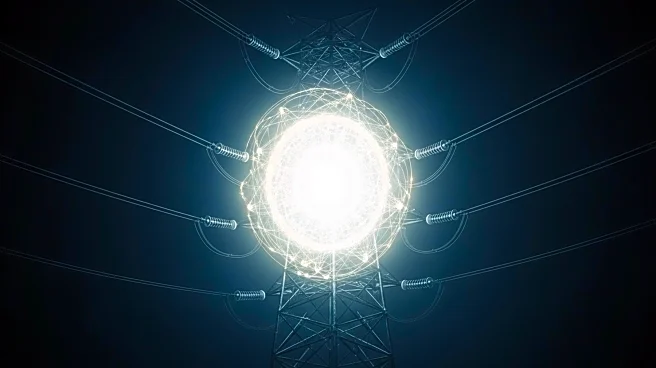What is the story about?
What's Happening?
The Zaporizhzhia nuclear plant in Ukraine, currently under Russian control, has been without external power for over three days, raising significant safety concerns. The plant, which is Europe's largest nuclear facility, is relying on emergency generators to maintain cooling and safety systems. The International Atomic Energy Agency (IAEA) Director General Rafael Grossi has expressed deep concern over the situation, which has persisted despite his recent meeting with Russian President Vladimir Putin. The outage began when the final power line was severed on the Russian side, and there is no immediate indication of when it will be restored. Ukrainian officials and Western experts suspect that Russia may be using the plant as leverage in the ongoing conflict, potentially taking steps to restart a reactor under wartime conditions. The plant has lost external power nine times previously, with damage typically occurring in Ukrainian-held areas due to Russian attacks on energy infrastructure.
Why It's Important?
The prolonged power outage at the Zaporizhzhia nuclear plant poses a significant risk of a nuclear accident, which could have catastrophic consequences for the region and beyond. The plant's reliance on emergency generators, which have a limited fuel supply, increases the likelihood of a meltdown if cooling systems fail. This situation underscores the broader geopolitical tensions between Russia and Ukraine, with potential implications for European security and energy stability. The plant's status as a bargaining chip in the conflict highlights the complex interplay between military strategy and nuclear safety. The international community, particularly European nations, may face increased pressure to intervene diplomatically to prevent a nuclear crisis.
What's Next?
There are indications that Russia is working to establish a new power line to the Zaporizhzhia plant through occupied territories, which could resolve the immediate power crisis. However, this move may be portrayed by Russia as a demonstration of control and capability, further complicating diplomatic efforts. The IAEA and other international bodies may need to intensify their engagement to ensure the plant's safety and prevent any unilateral actions that could escalate the situation. The potential restart of a reactor during wartime remains unprecedented and could set a dangerous precedent for nuclear safety standards globally.
Beyond the Headlines
The situation at the Zaporizhzhia plant highlights the ethical and legal challenges of operating nuclear facilities in conflict zones. The use of such facilities as strategic assets raises questions about the responsibilities of occupying forces under international law. Additionally, the potential environmental and humanitarian impacts of a nuclear incident in the region could have long-term consequences, affecting public health, agriculture, and regional stability. This crisis may prompt a reevaluation of nuclear safety protocols and emergency preparedness measures in conflict-prone areas.















